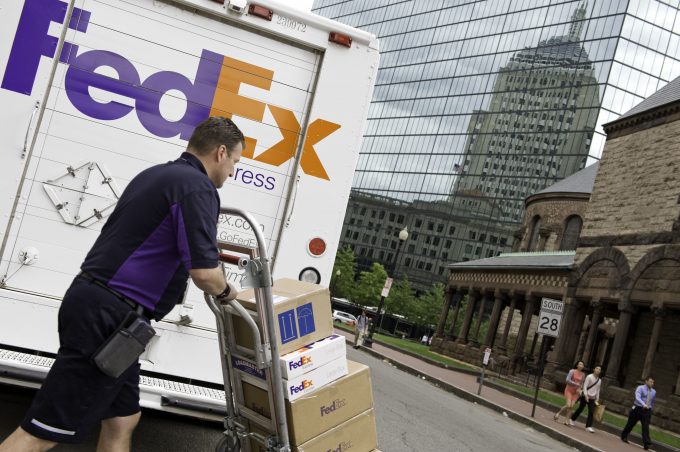SCD: As FedEx and UPS surcharges grow, competitors see an opportunity
SUPPLY CHAIN DIVE reports: More prevalent FedEx and UPS surcharges are limiting the upside of the ...
GM: RAISING THE ROOF GGM: IN FULL THROTTLE GZIM: MAERSK BOOST KNIN: READ-ACROSSMAERSK: NOT ENOUGHMAERSK: GUIDANCE UPGRADEZIM: ROLLERCOASTERCAT: HEAVY DUTYMAERSK: CATCHING UP PG: DESTOCKING PATTERNSPG: HEALTH CHECKWTC: THE FALLGXO: DEFENSIVE FWRD: RALLYING ON TAKEOVER TALKODFL: STEADY YIELDVW: NEW MODEL NEEDEDWTC: TAKING PROFIT
GM: RAISING THE ROOF GGM: IN FULL THROTTLE GZIM: MAERSK BOOST KNIN: READ-ACROSSMAERSK: NOT ENOUGHMAERSK: GUIDANCE UPGRADEZIM: ROLLERCOASTERCAT: HEAVY DUTYMAERSK: CATCHING UP PG: DESTOCKING PATTERNSPG: HEALTH CHECKWTC: THE FALLGXO: DEFENSIVE FWRD: RALLYING ON TAKEOVER TALKODFL: STEADY YIELDVW: NEW MODEL NEEDEDWTC: TAKING PROFIT

FedEx is targeting market share from freight forwarders, it said, as it announced fourth-quarter results buoyed by growth in e-commerce.
It reported a loss of $334m on the back of revenue of $17.4bn in Q4, a better-than-expected Covid-19 period, it said, with an operating margin of 2.7%.
Full-year results showed net income of $1.29bn on revenues of $69.2bn, with an operating margin of 3.5%.
FedEx said it had “hit the bottom” in mid-April, but had seen week-on-week improvement since, and could see signs of a “tentative recovery”.
“Here in the United States, the Covid pandemic has accelerated e-commerce adoption, while detrimentally affecting the B2B segment,” said Brie Carere, chief marketing and communications officer.
“Several years of retail share gains have been compressed into a few months, with e-commerce, as a percentage of US retail, increasing from 16% in calendar year 2019 to 27% by April 2020.”
She said: “Surging e-commerce sales from our large customers drove significant FedEx volume in Q4 and a sizable mix shift from commercial B2B to home delivery/B2C volume.”
Fourth-quarter residential volumes in the US rose to 72%, from 56% a year ago.
Ms Carere said: “We’re very, very pleased with what the team has done commercially on the revenue per piece from a B2C perspective.
“Overall, very, very happy with the capture on the surcharge. We’re trying to implement a two-tiered strategy where we actually push the revenue quality for the customers that create the surge, while protecting our small customer share, and that’s worked out quite effectively.”
Much of the earnings call was about “improving revenue quality” – or adding surcharges – as well as championing small and medium businesses, which would help FedEx “focus on profitable share growth from the sector”. It has also boosted its returns process in a bid to improve its e-commerce products.
Surcharges were introduced globally on FedEx Express and TNT air freight shipments “to balance demand against air cargo capacity”. PPE demand saw daily volumes out of Asia-Pacific growing substantially.
FedEx expects air cargo capacity to take 18 months to rebound, and is “renegotiating customer contracts to better reflect current market conditions”.
“We are well-positioned to profitably gain share from the freight forwarders,” said Ms Carere.
Tight air freight capacity will boost FedEx, added Raj Subramaniam, president and chief operating officer.
“As business gradually returns in Europe, we expect to continue to see the benefits of constrained air capacity. With freighter capacity now accounting for 75% of total air capacity in the transatlantic lane, FedEx capacity remains a premium. Increasing international profitability is a major priority for us and Europe is our biggest opportunity.
“We expect passenger airline capacity to be down for some time, and a significant portion of air cargo intercontinental goes on passenger aircraft. That traffic is now going to flow on FedEx capacity, which is a premium both on the transatlantic and transpacific.”
Covid-19 trigged a $125m increase in operating costs, for safety supplies and cleaning, and there was another $100m impact from other issues, including the elimination of the Amazon business. This, however, was partially offset by “strong residential delivery volume growth at FedEx Ground, a 10% increase in revenue per hundredweight at FedEx Freight and a favourable net impact from fuel”, explained Alan Graf, CFO.
FedEx gained $37m from the CARES Act, along with a Q4 tax benefit of $71m, and also extended its credit agreements and issued debt.
The trouble that is the TNT integration is expected to cost $1.7bn, with $170m of integration expenses expected in fiscal 2021. The much-awaited integration will be completed in fiscal 2022, some five years after the acquisition.
However, there appeared to be some good news for FedEx executives on the TNT front. A court case was launched by shareholders last year, claiming the management knew that TNT, which was hit by the NotPetya cyber attack shortly after the acquisition, was not going to reach the targets outlined to investors.
Shareholders claimed the management failed to disclose the problems and sold $56m-worth of shares. However, the case has now been closed, and although the detailed outcome is not yet available publicly, it appears to have been won by FedEx management.
FedEx ended the fiscal year with $4.9bn in cash and cash equivalents and with $3.5bn available under credit facilities.
For more in-depth financial analysis, go to Loadstar Premium; you can read the transcript of the investor call on Seeking Alpha, here, and see the full results here.
Comment on this article